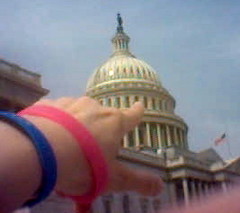The Other Side
Just to show Jonathan I can have an ounce of objectivity, I found this article in the Jerusalem Post by Matthew Gutman. It is called, "It is not the apocalypse" -- the advice of Nahum Sheffer, a Sinai evacuee, to the people in Gush Katif.
"There is life after the destruction."
He'd know. His being forced to leave his home in 1982 due to the withdrawal from the Sinai caused him to lose his wife to a mental institution (she had a breakdown from the pressure) to this day. He was penniless. Three years later, his 19-year-old son was killed in combat in Lebanon. He's been through the mill, but he's come out the other side.
"I can't say I live 'the good life,' but I do live a beautiful life."
He is now living in a thriving farming community, north of Gaza. He understands what the people of Gush Katif are going through and recommends they pick up the pieces and start again, "otherwise you cannot live."
Words to the wise from others who had to move from the Sinai pullout?
The Sinai veterans told them that moving en masse to a similar type of community eased their experience. But they also warned that the government's efforts to publicly delegitimize the settlers caused the greatest damage.
Like Sheffer, many of the community members bear the scars of that time, scars recently inflamed by Sharon's decision to proceed with the second population transfer in Israel's history. Ein Habesor families bitterly recall that in 1982, people dubbed them "destroyers of Israel," and their new community Dallas, after the hit TV show that featured a spendthrift Texas family.
Sadly many of these people were treated horribly. Some were swindled out of money by contractors. Shopkeepers would not accept checks upon noticing "Bank Hapoalim Yamit," stamped on a checkbook. One woman tearfully shared the following memory:
After the evacuation, some of Ein Habesor's children were not accepted into certain area schools; they were accused of "sucking the land dry."
Ein Habesor residents offered a different term for when we refer to people who live in the cities and towns.
The Sinai settlers – Ein Habesor residents preferred the term "pioneers" – also clamored to set up their new communities on the Nitzanim beach, but were rebuffed. The government had found it more economical to pay them for each nut and bolt than to prepare new housing for them.
In the current plan to relocate Gush Katif settlers to Nitzanim, the government seems to have learned a lesson from Sinai. But Sheffer fears "that both sides will think they are standing against the enemy, but they are not."
We all know it's going to be tough for the pioneers. My heart goes out to them. At the end of the article, Sheffer said something that resonates...
"The toughest day," he responded, "is after the evacuation. The real struggle for them will begin when the headlines end, and no one remembers."
But hopefully we who populate the blogway will.







3 Comments:
"...overblown sense of entitlement and bloodlust of an unreformed, medieval faith."
Hear, hear!
Arabs did not live in this area before the Islamic conquest anyway and so if we are to bring out the "entitlement" issue from the historical perspective as their main argument it simply won't hold the water.
Esther, you crack me up! None of us would even pretend to be objective on such a passionate issue. What we bring to the issue are our differing points of view, and in doing so, we learn from each other. Many times your writing has caused me to question some of my views (and perhaps moderate them, somewhat). To paraphrase Malcomb Forbes, "The purpose of education is to replace an empty mind with an open mind." In that sense, we have shown each other that we are educated. Thanks for keeping me on my toes, too!
Send me an e-mail (address linked on my site) when you get to town for the AIPAC meetings! I hope you are having a wonderful Passover.
-- Jonathan
Awww, thanks Jonathan. :) :) Will do!
Post a Comment
<< Home